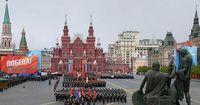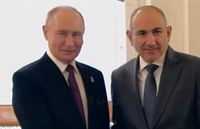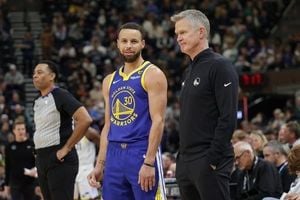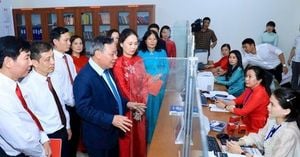On May 9, 2025, Moscow hosted a grand Victory Parade marking the 80th anniversary of the end of World War II, drawing leaders from around the globe to pay tribute to the sacrifices made during the conflict. Among the notable attendees was Belarusian President Alexander Lukashenko, who arrived in the Russian capital with his son, Nikolai, to participate in the commemorative events.
Lukashenko was one of the first dignitaries to arrive at the St. Andrew's Hall of the Kremlin, where he attended a concert for heads of delegations invited to the celebrations. He joined other prominent leaders, including Russian President Vladimir Putin, Chinese President Xi Jinping, and Armenian Prime Minister Nikol Pashinyan, who also gathered for the occasion. The presence of such high-profile figures underscored the significance of the event, which has become a focal point for diplomatic engagement.
As the day unfolded, many leaders were seen shaking hands and posing for photographs, symbolizing unity and shared history. Notably, Armenian Prime Minister Nikol Pashinyan arrived in Moscow to participate in the events and was expected to attend the parade itself, further emphasizing the importance of the occasion for regional cooperation.
However, not all leaders faced an easy journey to the celebrations. Slovak Prime Minister Robert Fico encountered significant travel issues, as Estonia, Lithuania, and Latvia denied his plane passage through their airspace. Fico eventually managed to land in Vnukovo, Moscow, on May 8, 2025, as reported by Life.ru, which published footage of his arrival.
The parade itself was a showcase of military might and national pride, featuring Belarusian soldiers marching alongside their Russian counterparts on Red Square. This display highlighted the close ties between Belarus and Russia, especially in the context of their shared historical narrative regarding World War II.
In addition to Lukashenko and Pashinyan, several other leaders arrived early for the festivities. Brazilian President Luiz Inacio Lula da Silva, Chinese Chairman Xi Jinping, Kazakh President Kassym-Jomart Tokayev, Tajik President Emomali Rahmon, and Uzbek President Shavkat Mirziyoyev were among those present. Their attendance not only reflects the importance of the event but also signifies the ongoing diplomatic relationships between these nations and Russia.
Serbian President Aleksandar Vucic faced his own set of challenges in reaching Moscow. His plane was also barred from flying over the airspace of Lithuania and Latvia, forcing it to make an unplanned stop in Baku. Reports suggest this detour was either due to a need for refueling or concerns regarding air defense systems, illustrating the complexities of international travel amid heightened security.
While many leaders successfully made it to the parade, some notable absences were felt. The head of Laos, Thongloun Sisoulith, canceled his visit due to a severe case of coronavirus, with the Minister of Foreign Affairs attending in his stead. Additionally, Azerbaijani President Ilham Aliyev opted out, citing participation in internal events commemorating his father, Heydar Aliyev, who led Azerbaijan from 1993 to 2003.
Countries like India, Indonesia, Nicaragua, North Korea, and South Africa were represented by high-ranking delegations, yet their leaders did not attend the parade. This absence of heads of state from major nations may indicate a shift in diplomatic priorities or concerns regarding the implications of participating in such a politically charged event.
In preparation for the celebrations, Moscow implemented unprecedented security measures, including restrictions on mobile internet access during the commemorative period. These steps were taken to ensure the safety and security of attendees and to maintain order during the high-profile events.
The Victory Parade has long been a symbol of Russia's resilience and military strength, and the 80th anniversary was no exception. The gathering of international leaders served as a reminder of the ongoing geopolitical dynamics and the importance of historical memory in shaping contemporary relationships.
As the parade concluded, the leaders departed with a renewed sense of purpose, reflecting on the sacrifices of the past while navigating the complexities of the present. The event not only honored those who fought during World War II but also reinforced the connections between nations, highlighting the continuing relevance of cooperation and dialogue in an increasingly fragmented world.





